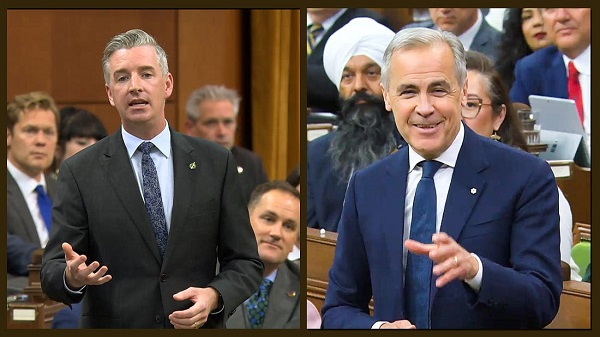National
Question Period : Barrett vs. Carney Clash Over Offshore Investments


 Dan Knight
Dan Knight
Prime Minister faces questions over blind trust and past ties to tax havens, as Conservatives demand greater financial transparency on day one of the 45th Parliament.
On the very first day of the 45th Parliament, Canadians witnessed a spectacle that was as revealing as it was disturbing. Conservative MP Michael Barrett stood up and did what any responsible representative should do: he asked Prime Minister Mark Carney to come clean about his offshore investments and potential conflicts of interest. But instead of facing the music, Carney pulled a classic elitist maneuver—he hid behind his House Leader, who delivered a canned response full of platitudes and devoid of substance.
This wasn’t just a missed opportunity for transparency; it was a calculated evasion. Carney, the former banker who helped Brookfield Asset Management establish funds in Bermuda and the Cayman Islands, is now Canada’s Prime Minister. And when pressed about whether any of his investments were previously held in tax havens, he couldn’t even muster the courage to answer for himself. Instead, he let a subordinate deflect with talk of “stringent ethics guidelines” and “economic priorities.” Meanwhile, Canadians are struggling to afford basic necessities, and they deserve to know if their leader is playing by the same rules—or any rules at all.
Barrett—one of the few people in Ottawa actually doing his job—didn’t hold back. As Shadow Minister for Ethics and Accountable Government, he called out Prime Minister Mark Carney for what appears to be a massive financial shell game. The accusation? That Carney, during his time as a high-flying executive at Brookfield Asset Management, helped funnel billions into offshore tax havens—Bermuda, the Caymans, you name it—and then conveniently tucked those assets away in a so-called “blind trust” right before stepping into public office.
Barrett’s message was simple and devastating: “Canadians are lined up at food banks in record numbers. They can’t pay their rent, but they are paying their taxes.” Meanwhile, the guy running their government may have spent years helping billionaires avoid paying theirs. Barrett demanded straight answers: Were any of Carney’s current holdings, now supposedly out of sight, previously parked in these offshore tax shelters? And what exactly was he sitting on when he walked into that first cabinet meeting?
The allegations stem from Carney’s role as chairman of Brookfield from 2020 to January 2025, where he co-chaired funds worth $25 billion registered in Bermuda and a $5 billion fund in the Cayman Islands, according to CBC News reports. These arrangements, which reportedly allowed Brookfield to avoid $5.3 billion in taxes, have drawn scrutiny amid Canada’s economic challenges, including rising food bank usage and housing affordability issues.
In response, the Liberal government House Leader defended Carney, dismissing Barrett’s questions as “hypotheticals and conjured scenarios.” “The Prime Minister has followed all the rules even before they were required,” the House Leader stated, emphasizing that Carney’s blind trust complies with Canada’s “stringent ethics guidelines.” The response pivoted to the government’s agenda, citing efforts to create “the strongest economy in the G7,” reduce taxes, and build new homes, while accusing the opposition of “digging dirt on day one.” The House Leader’s retort, “Shame on them,” drew murmurs of support from Liberal benches.
Undeterred, Barrett doubled down, arguing that Canadians “don’t want an explanation on how to bend over backwards to fit through ethical loopholes.” He called for assurance that Carney’s actions go “above just the basic minimum standard,” referencing a decade of perceived Liberal ethical lapses. “Can he stand up and assure Canadians that none of the funds he had previously were held in offshore tax havens?” Barrett asked, pressing for specifics on Carney’s financial holdings.
The Liberal response reiterated Carney’s compliance, with the House Leader asserting, “Canada has among the most stringent ethics guidelines in the world… The Prime Minister is busy creating opportunity for Canada, standing up in a trade war against the United States.” The deflection, focusing on economic priorities and dismissing the opposition’s probe as a distraction, left Barrett’s core questions unanswered, fueling Conservative claims of evasion.
This entire exchange isn’t just about one question or one day—it’s part of a much larger and very necessary effort by Conservatives to expose something Canadians are starting to see with painful clarity: Mark Carney is not one of them. He’s not scraping to make rent. He’s not standing in a food bank line. He’s not worried about carbon taxes or grocery bills. He’s a Davos man, parachuted into the Prime Minister’s Office by the same Liberal elite that gave us Justin Trudeau. Different face. Same contempt.
Barrett’s takedown of Carney over offshore tax havens hit a nerve, and rightly so. According to Canadians for Tax Fairness, this country loses a jaw-dropping $30 billion every year to offshore tax avoidance. That’s money that working Canadians pay so the elite can squirrel away their wealth in places like Bermuda and the Cayman Islands. And Carney? He helped orchestrate it. As a top dog at Brookfield Asset Management, he didn’t just benefit from the system—he helped design it. And if that wasn’t enough, under his leadership, Brookfield moved its headquarters from Toronto to New York. In the middle of growing trade tensions with President Trump’s America. That’s not leadership—it’s betrayal.
And how does Carney justify all this? With the most nauseating phrase in the English language: “It was legal.” Oh, well, as long as the loopholes were big enough to drive a luxury yacht through, I guess we’re fine. He claims these “tax-efficient” strategies helped pensioners and that his blind trust protects him from conflicts. Right. Because what better way to gain public trust than hiding your financial interests in a vault and telling voters, “Just trust me”?
Barrett and the Conservatives aren’t buying it—and neither should you. They’re calling for real reform, tougher disclosure rules, and an end to the wink-wink, nudge-nudge ethics games that the Liberals have been playing for a decade. Carney delayed his financial disclosures during his leadership run? Of course he did. That’s not transparency. That’s strategy. And Canadians know it.
Even the so-called experts are noticing the shift. One analyst noted Barrett’s attacks are landing with voters because they’re the ones who are actually suffering. Meanwhile, the Liberals want to pivot to their so-called “economic wins.” Great. Tell that to the family paying $7 for lettuce or the trucker trying to fuel his rig with gas prices through the roof.
As Parliament gets underway, we’re heading into a full-blown war over ethics and economic justice. And the question for Carney is simple: Is he going to answer for his record—or is he going to keep hiding behind the same smug Liberal arrogance that Canadians are sick and tired of?
The people are watching. The mask is off. And Mark Carney has a choice: come clean—or be dragged into the sunlight.
Censorship Industrial Complex
Pro-freedom group warns Liberal bill could secretly cut off Canadians’ internet access

From LifeSiteNews
“The minister could order this dissident’s internet and phone services be cut off and require that decision remain secret”
Free speech advocates have warned that the Liberals’ cybersecurity bill would allow them to block any individual’s internet access by secret order.
During an October 30 Public Safety committee meeting in the House of Commons, Canadian Constitution Foundation (CCF) counsel Josh Dehaas called for Liberals to rewrite Bill C-8, which would allow the government to secretly cut off Canadians access to the internet to mediate “any threat” to the telecommunications system.
“It is dangerous to civil liberties to allow the minister the power to cut off individual Canadians without proper due process and keep that secret,” Dehaas testified.
“Consider for example a protestor who the minister believes ‘may’ engage in a distributed denial of service attack, which is a common form of civil disobedience employed by political activists,” he warned.
“The minister could order this dissident’s internet and phone services be cut off and require that decision remain secret,” Dehaas continued, adding that the legislation does not require the government to obtain a warrant.
In response, Liberal MP Marianne Dandurand claimed that the legislation is aimed to protect the government form cyberattacks, not to limit freedom of speech. However, Dehaas pointed out that the vague phrasing of the legislation allows Liberals to censor Canadians to counter “any threat” to the telecommunications system.
Bill C-8, which is now in its second reading in the House of Commons, was introduced in June by Minister of Public Safety Gary Anandasangaree and contains a provision in which the federal government could stop “any specified person” from accessing the internet.
The federal government under Prime Minister Mark Carney claims that the bill is a way to stop “unprecedented cyber-threats.”
The bill, as written, claims that the government would need the power to cut someone off from the internet, as it could be “necessary to do so to secure the Canadian telecommunications system against any threat, including that of interference, manipulation, disruption, or degradation.”
Many Canadians, including Conservative MPs and freedom groups, have condemned the legislation, along with several other new Liberal bills which aim to censor internet content as well as go after people’s ability to speak their minds.
“Experts and civil society have warned that the legislation would confer ministerial powers that could be used to deliberately or inadvertently compromise the security of encryption standards within telecommunications networks that people, governments, and businesses across Canada rely upon, every day,” the Canadian Civil Liberties Association wrote in a recent press release.
Similarly, Canada’s own intelligence commissioner has warned that the bill, if passed as is, could potentially be unconstitutional, as it would allow for warrantless seizure of a person’s sensitive information.
Automotive
Canada’s EV experiment has FAILED

By Dan McTeague
The government’s attempt to force Canadians to buy EVs by gambling away billions of tax dollars and imposing an EV mandate has been an abject failure.
GM and Stellantis are the latest companies to back track on their EV plans in Canada despite receiving billions in handouts from Canadian taxpayers.
Dan McTeague explains in his latest video.
-

 Business2 days ago
Business2 days agoTrans Mountain executive says it’s time to fix the system, expand access, and think like a nation builder
-

 International2 days ago
International2 days agoBiden’s Autopen Orders declared “null and void”
-

 MAiD2 days ago
MAiD2 days agoStudy promotes liver transplants from Canadian euthanasia victims
-

 Business2 days ago
Business2 days agoCanada has given $109 million to Communist China for ‘sustainable development’ since 2015
-

 Internet2 days ago
Internet2 days agoMusk launches Grokipedia to break Wikipedia’s information monopoly
-

 Business2 days ago
Business2 days agoCanada’s combative trade tactics are backfiring
-

 Automotive2 days ago
Automotive2 days agoCarney’s Budget Risks Another Costly EV Bet
-

 Business2 days ago
Business2 days agoYou Won’t Believe What Canada’s Embassy in Brazil Has Been Up To







